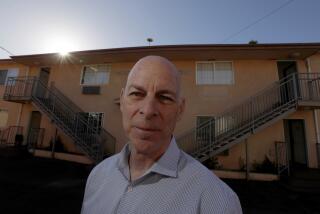Documents Point to Former HUD Chief’s Intervening on Behalf of Certain Projects
- Share via
WASHINGTON — Additional evidence emerged Friday that former Housing and Urban Development Secretary Samuel R. Pierce Jr., who has frequently been described as an aloof manager, intervened on behalf of selected projects during his eight-year tenure at the agency.
In the clearest example yet of his direct involvement on behalf of a HUD project requested by a political ally, Pierce helped Sen. Strom Thurmond (R-S.C.) receive mortgage financing for a Spartanburg, S.C., project in 1982, according to Pierce files made available under a Freedom of Information Act request.
Pierce received a letter from Thurmond in February of 1982 requesting his assistance in obtaining HUD funding for the project.
In a handwritten note, Pierce instructed his executive assistant, Lance H. Wilson, to: “Take care of this and let me know when final decision is made. If it cannot be done, communicate with me immediately!” Pierce underlined the last three words in the message and scribbled another note in the upper right corner of the memo: “They got the funds.”
Congessional Testimony
Pierce maintained during congressional testimony in May that he merely passed on the many requests he received for special treatment without making a recommendation. In one other case, however, he also lent his weight to a request from the Harlem Hospital Building for the Mentally Handicapped that the department grant the project a special extension.
“Why can’t we waive this objection?” Pierce wrote on a memo that outlined objections made by the Federal Housing Administration. “This is important to the people of Harlem.”
Thousands of pages of documents obtained from HUD show that Pierce was selectively involved in much of the workings of his massive agency. In several cases, his deputies made a special point of alerting him to questionable situations.
Outlined Concerns
A 1982 letter to Pierce from Theodore R. Britton Jr., HUD’s debt collection officer, outlined Britton’s concerns about the agency’s problems recovering payments on housing loans. “While I hesitate to be an alarmist, I begin to feel an uneasiness about how well you are being served by your financial executives,” Britton wrote.
In the letter, Britton cited one case in which the Atlanta regional office was not billing debtors who owed HUD repayments on rehabilitation loans “because of a lack of envelopes.”
“In private life, people who are so derelict are fired,” Britton said.
Pierce received many such warnings during his years at HUD, the records show. What the documents do not always indicate, however, is what action Pierce did or did not take in response to the warning signs that came across his desk.
Chastised for Role
Pierce, records show, was chastised by the Office of Government Ethics for his role in supporting a fair-housing campaign that was financed by soliciting members of the housing industry who did business with HUD.
The campaign, which was conceived by Pierce’s executive assistant, Deborah Gore Dean, turned into a three-year promotional road show that cost $1 million and took Pierce to Baltimore, Dallas, New Orleans, New York, Oakland, Philadelphia and Columbus, Ohio.
Dean told reporters in 1987 that she and other officials at the agency had worked on raising the funds but denied that contributors expected special favors in HUD contracts in return.
An internal HUD legal opinion, requested after the Los Angeles Times reported on the fair-housing program, supported Dean’s defense of the way the program was run. Last June, however, the Office of Government Ethics (OGE) sent Pierce a follow-up analysis that was not similarly publicized.
“We disagree . . . with the General Counsel’s conclusion that there were no violations of the standards of conduct,” OGE director Frank Q. Nebeker wrote Pierce.
“Since there is no evidence that Congress intended the Department’s educational activities to be conducted outside the scope of the standards of conduct, I see no basis for submitting HUD employees to a different standard on fund-raising from that applicable to government employees in general,” Nebeker wrote.
More to Read
Sign up for Essential California
The most important California stories and recommendations in your inbox every morning.
You may occasionally receive promotional content from the Los Angeles Times.













